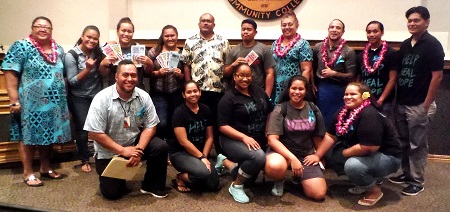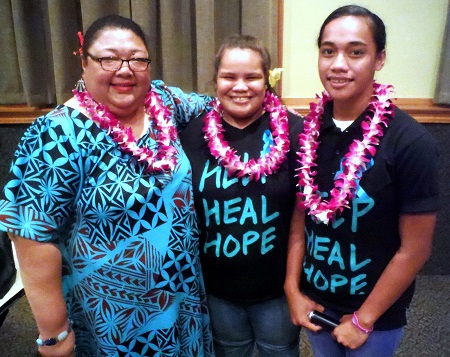
Members of the ASCC Health & Human Services Club, including advisor Derek Helsham (front, far left) are seen here with the guest speakers at last week's Sexual Assault Awareness Forum. Speakers included Mrs. Judy Mata'utia and Mrs. Mona Uli from the Alliance Against Domestic and Sexual Violence, Dr. Peni Biukoto of the DOH Behaviorial Health Clinic, and Mr. Ioana Vaimaona, a certified self-defense martial arts instructor. (Photo: J. Kneubuhl)

Mrs. Judy Mata'utia (left) is seen here with ASCC students Faatele Tyrell (middle) and Health & Human Services Club President Alice Tausaga following the Sexual Assault Awareness Forum last week at the College, sponsored by the Health & Human Services Club. (Photo: J. Kneubuhl)

Members of the ASCC Health & Human Services Club, including advisor Derek Helsham (front, far left) are seen here with the guest speakers at last week's Sexual Assault Awareness Forum. Speakers included Mrs. Judy Mata'utia and Mrs. Mona Uli from the Alliance Against Domestic and Sexual Violence, Dr. Peni Biukoto of the DOH Behaviorial Health Clinic, and Mr. Ioana Vaimaona, a certified self-defense martial arts instructor. (Photo: J. Kneubuhl)
ASCC Hosts Sexual Assault Awareness Forum
April 27, 2017
By James Kneubuhl, ASCC Press Officer
The Health and Human Services Club at the American Samoa Community College (ASCC) sponsored a Sexual Assault Awareness Forum on Thursday, April 27th. As with previous forums on the subject, the event featured guest speakers from the community who work in the area of raising public awareness of both the prevalence of sexual assault in our community as well as the services available to victims. Speakers included Judy Mata’utia and Mona Uli from the American Samoa Alliance Against Domestic and Sexual Violence; Dr. Peni Biukoto, Psychiatrist with the Behavioral Health Clinic, a division of the Department of Health; and Ioane Vaimaona, Certified Self-Defense Marshall Arts Instructor.
Mata’utia spoke first, and described the efforts of the Alliance Against Domestic and Sexual Violence to raise awareness of sexual assault in American Samoa through workshops and training in the community. “Many people in the Territory still believe that sexual assault does not exist in American Samoa,” she reflected, “or else they simply don’t acknowledge it because of a culture of silence. The Alliance tries to bring this problem to the attention of the public, as well as inform them of the help available for victims.” While not a service provider itself, the Alliance tries to create a “safe space” for victims while supporting the actual service providers such as LBJ Hospital and the Department of Health. “Soon many of you will be husbands, wives and parents,” Mata’utia said to the student audience, “so it’s important for you to know that this problem exists in our community.”
Continuing with the theme of raising awareness, Mona Uli reiterated how the Alliance serves as a resource for the community, and then she screened a short video emphasizing the importance of individual intervention in situations where a sexual assault appears even remotely possible. The video shows a party with young adults, both male and female, becoming steadily more intoxicated. Two scenarios are then presented. In the first, a male guides an inebriated female through the crowd towards a bedroom “so she can rest,” and no one appears to even take much notice. Once the male shuts the bedroom door, there is a clear implication that an assault will take place. In the second scenario, friends who know the female continually intervene on her behalf. Before the male is even halfway across the room, the girl’s friends have stopped her from consuming further alcohol and have even called a cab to take her home safely. The point being that when friends look after each other, a perpetrator has a harder time making one of them a victim.
Dr. Biukoto spoke next, and gave a thorough overview of the risk factors that can result in forms of violence, including sexual violence, and the psychological, emotional and physical effects violence can have on victims. Following his presentation, he gave the opportunity for audience to ask questions, and one of the first inquiries, addressed to all the speakers present, came from a young lady who wanted to know, “How effective are all of these programs in preventing sexual assault in our community?” Mata’utia responded that turning the tide in the incidents of sexual violence is up to the community. “There can never be too much awareness,” she said. “Agencies like Alliance alone cannot put a stop to sexual assault, but individuals and the community can.”
For the final presentation of the forum, Ioane Vaimaona shared information on the self-defense classes he offers for women through his organization Sexual Assault Defense (S.A.D.) of American Samoa. A martial arts student since age 14, Vaimaona has studied Brazilian Jujitsu and has previously worked with a successful self-defense program in Los Angeles, the Gracie Academy, which teaches martial arts techniques women can use to “neutralize” an attacker. He shared videos of these techniques being applied, and explained that anyone interested in learning them can contact him through the Alliance. “A sexual assault is like a tsunami,” he said, “you can hope it never happens, but if it does, you should know what to do.”
Following the formal conclusion of the event, the guests took time to speak with students one-on-one, and received small tokens of appreciation from Health & Human Services Club members, their president Alice Tausaga, and club advisor/Human Services instructor Derek Helsham.
